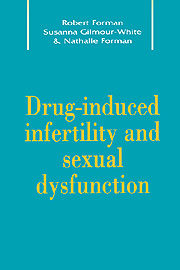7 - Miscellaneous drugs
Published online by Cambridge University Press: 30 March 2010
Summary
Gastrointestinal drugs
Cimetidine
Cimetidine was first introduced in the USA for the treatment of duodenal ulcer in 1978. It is a histamine (H2) receptor antagonist that was generally thought to be well tolerated apart from the known occurrence of gynaecomastia. In 1979, however, several case reports appeared in the UK and the USA suggesting that cimetidine was associated with impotence (Wolfe, 1979; Peden et al, 1979). It was suggested that because minor elevations of gonadotrophins, testosterone and prolactin were found this side effect may have an endocrine basis. However, these hormonal disturbances were mild and unlikely to influence sexual function directly. A study in the USA of seven men taking cimetidine reported an average reduction in sperm count of 43% after 6 weeks of therapy, although sperm concentrations remained within the normal range (Van Thiel et al. 1979). Furthermore, although there was no difference in basal FSH or LH before or after cimetidine, testosterone levels were higher after treatment. The authors postulated that as cimetidine is an antiandrogen it might be having an atrophic effect on androgen-dependent tissues (similar findings had been recorded in rats given cimetidine).
This study was subsequently criticised on methodological grounds, specifically that spermatogenesis is known to take over 10 weeks whereas the authors were reporting decreased sperm counts after 6 weeks. (White, Gore & Jewell, 1979). A case report has also described rapid and reversible loss of libido in a woman within 3 days of commencing cimetidine (Pierce, 1983). The authors suggested that, as androgens are thought to stimulate libido in women, the antiandrogenic action of cimetidine might have the opposing effect.
- Type
- Chapter
- Information
- Drug-Induced Infertility and Sexual Dysfunction , pp. 92 - 105Publisher: Cambridge University PressPrint publication year: 1996



